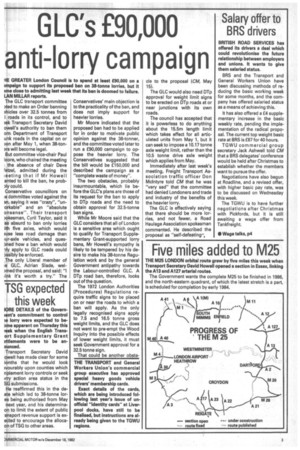LC's £90,000 anti-lorry campaign
Page 3

If you've noticed an error in this article please click here to report it so we can fix it.
HE GREATER London Council is to spend at least £90,000 on a iMpaign to support its proposed ban on 38-tonne lorries, but it ime close to admitting last week that its ban is doomed to failure. IN MILLAR reports.
he GLC transport committee ) ed to make an Order banning ) icles over 32.5 tonnes from I roads in its control, and to )ek Transport Secretary David oWell's authority to ban them em Department of Transport u ik roads in the capital on or )On after May 1, when 38-ton)rs will become legal.
But committee vice-chair Paul oore, who chaired the meeting the absence of chair Dave Fetzel, admitted during the leeting that if Mr Howell anted to kill the ban, he prob)1Y could.
Conservative councillors on le committee voted against the 3n, saying it was "crazy", "unorkable" and an "absolute onsense". Their transport ) kesman, Cyril Taylor, said it a absurd to ban only lorries ii five axles, which would i se less road damage than
■ r-axle vehicles, and ques'fled how a ban which would ily apply to GLC roads could )ssibly be enforced.
The only Liberal member of lel GLC, Adrian Slade, wel'Med the proposal, and said: "I link it's worth a try." The Conservatives' main objection is to the practicality of the ban, and does not imply support for heavier lorries.
Mr Moore indicated that the proposed ban had to be applied for in order to motivate public opinion against the 38-tonner, and the committee voted later to run a 00,000 campaign to oppose the heavier lorry. The Conservatives suggested that the bill would be £150,000 and described the campaign as a "complete waste of money".
The two obstacles, probably insurmountable, which lie before the GLC's plans are those of its request for the ban to apply to DTp roads and the need to obtain approval for 32.5-tonne ban signs.
While Mr Moore said that the GLC considers that all of London is a sensitive area which ought to qualify for Transport Supplementary Grant-supported lorry bans, Mr Howell's sympathy is likely to be tempered by his desire to make his 38-tonne Regulation work and by the general Government antipathy towards the Labour-controlled GLC. A DTp road ban, therefore, looks out of the question.
The 1972 London Authorities (Procedures) Regulations require traffic signs to be placed on or near the roads to which a ban will apply. As the only legally recognised signs apply to 7.5 and 16.5 tonne gross weight limits, and the GLC does not want to pre-empt the Wood Inquiry into the possible effects of lower weight limits, it must seek Government approval for a 32.5 tonne sign.
That could be another obsta cle to the proposal (CM, May 15).
The GLC would also need DTp approval for weight limit signs to be erected on DTp roads at or near junctions with its own roads.
The council has accepted that it is powerless to do anything about the 15.5m length limit which takes effect for all articulated units from May 1, but it can seek to impose a 10.17 tonne axle weight limit, rather than the 10.5 tonne drive axle weight which applies from May.
Immediately after last week's meeting, Freight Transport Association traffic officer Don McIntyre told CM that he was "very sad" that the committee had denied Londoners and trade and industry of the benefits of the heavier lorry.
The GLC is effectively saying that there should be more lorries, and not fewer, a Road Haulage Association spokesman commented. He described the proposal as "self-defeating-,




































